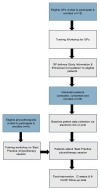Knowledge translation and exercise for degenerative meniscal pathology and early osteoarthritis (KNEE-DEeP): Protocol for a single arm feasibility study
- PMID: 40028467
- PMCID: PMC11868751
- DOI: 10.12688/hrbopenres.14049.1
Knowledge translation and exercise for degenerative meniscal pathology and early osteoarthritis (KNEE-DEeP): Protocol for a single arm feasibility study
Abstract
Background: The Knowledge Translation and Exercise for Degenerative Meniscal Pathology and Early Knee Osteoarthritis (KNEE-DEeP) intervention was designed to promote greater uptake of evidence-based non-surgical treatments for knee pain attributed to degenerative meniscal pathology and early knee osteoarthritis (OA) in primary care, by tackling barriers at a service, clinician and patient level. Evidence indicates that patients frequently do not access first-line treatments, namely exercise and patient education, prior to specialist referral. The KNEE-DEeP intervention supports general practitioners (GPs) and physiotherapists to enhance their skills and confidence in managing patients with this type of knee pain through professional development workshops. In turn, patients will receive an 'enhanced consultation' from their GP and be referred to an early 'best practice' physiotherapy session. Physiotherapists will work with patients to develop a collaborative action plan focussing on self-management and exercise.
Methods: This protocol outlines a single arm non-randomised feasibility study with a mixed method process evaluation. The study intends to recruit 15 GPs, five physiotherapists and 36 patients from general practices in the South-West of Ireland. Eligible patients, will be aged between 35 years and 69 years inclusive, and attend their GP with an episode of non-traumatic knee pain attributed to a degenerative meniscal tear (DMT) or early OA. Physiotherapists and GPs will be trained in intervention delivery. Within two weeks of receiving an 'enhanced consultation' from their participating GP, patients will attend the one-hour 'best practice' physiotherapy session. Patient data will be collected via online questionnaires at baseline, 12 weeks and 6 months. Qualitative interviews to assess the feasibility and acceptability of the intervention will be conducted with a purposive sample of GPs, physiotherapists and their enrolled patients.
Ethics and dissemination: Approved by Clinical Research Ethics Committee of the Cork Teaching Hospitals. Results will be presented in peer-reviewed journals and at international conferences.
Registration: clinicaltrials.gov ( NCT06576557).
Keywords: degenerative meniscal tear; exercise therapy; feasibility study; knee osteoarthritis; primary care.
Copyright: © 2025 O'Leary H et al.
Conflict of interest statement
No competing interests were disclosed.
Figures
Similar articles
-
"You're stuck in the middle here": a qualitative study of GPs' experiences of managing knee pain attributed to a degenerative meniscal tear.BMC Prim Care. 2023 Jun 21;24(1):127. doi: 10.1186/s12875-023-02075-9. BMC Prim Care. 2023. PMID: 37344762 Free PMC article.
-
Effectiveness of a new model of primary care management on knee pain and function in patients with knee osteoarthritis: Protocol for THE PARTNER STUDY.BMC Musculoskelet Disord. 2018 Apr 30;19(1):132. doi: 10.1186/s12891-018-2048-0. BMC Musculoskelet Disord. 2018. PMID: 29712564 Free PMC article. Clinical Trial.
-
Protocol for the process and feasibility evaluations of a new model of primary care service delivery for managing pain and function in patients with knee osteoarthritis (PARTNER) using a mixed methods approach.BMJ Open. 2020 Feb 4;10(2):e034526. doi: 10.1136/bmjopen-2019-034526. BMJ Open. 2020. PMID: 32024793 Free PMC article.
-
Arthroscopic partial meniscectomy combined with medical exercise therapy versus isolated medical exercise therapy for degenerative meniscal tear: A meta-analysis of randomized controlled trials.Int J Surg. 2020 Jul;79:222-232. doi: 10.1016/j.ijsu.2020.05.035. Epub 2020 Jun 6. Int J Surg. 2020. PMID: 32522685 Review.
-
Evaluation and Treatment of Knee Pain: A Review.JAMA. 2023 Oct 24;330(16):1568-1580. doi: 10.1001/jama.2023.19675. JAMA. 2023. PMID: 37874571 Review.
References
-
- Ashmore K, Smart K, O’Toole G, et al. : Triage of knee pain by an Extended Scope Physiotherapist (ESP) in an orthopaedic clinic: a clinical audit. Physiother Pract Res. 2014;35(1):25–32. 10.3233/PPR-130034 - DOI
Associated data
LinkOut - more resources
Full Text Sources
Medical



